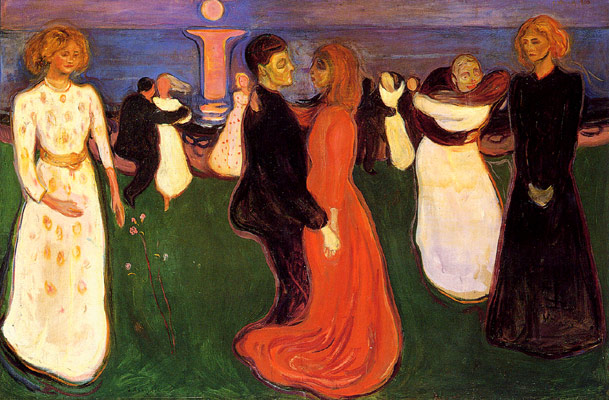
Edvard Munch, The Dance of Life (1899-1900), oil on canvas, National Gallery, Oslo

Edvard Munch, The Dance of Life
(1899-1900), oil on canvas, National Gallery, Oslo
Theater Reviews and Secondary/Critical
Readings are available via Blackboard and/or the
syllabus; the bibliography is located here. Please bring these assigned
texts to class please.
| Date |
Class Activities | Homework Due | Supplemental Readings |
| T 1/17 |
Course + student intro.; Elements of Drama; Anti-Aristotelian Drama | Next week's reading assignment is in the cell below | Innes, "Introduction" to A Sourcebook on Naturalist Theatre (1-42, through the "Chronology") |
| T 1/24 |
A Doll House; PP1 | Read Ibsen, A Doll House; theater reviews (incl. alt. ending); Innes on Ibsen (65-96); Templeton, J. "Doll House Backlash"; Position Paper (PP) #1 (Ibsen, Doll House) | Moi, "First and Foremost a Human Being" |
| 1/31 |
Citation; Hedda Gabler; the New Woman | Read Ibsen, Hedda Gabler; theater reviews; Finney, "Maternity and Hysteria;" Innes, Sourcebook 108-22; & at least 1 of the suppl. readings | Finney, "Ibsen and Feminism;" Torrey-Barstow, "Hedda is All of Us" |
| T 2/7 | Freud and Breuer on Hysteria; PP2 | Read Freud and Breuer 7-20,
25-186; Fluhr; a suppl. article is recommended; and write PP2 (Freud) |
Bogousslavsky et al.; Freud;" Furst; Hunter; Gray; and Møllerhøj |
| T 2/14 |
Miss Julie; PP3; Strindberg and Helium | Read Strindberg, Miss Julie; theater reviews; Templeton, A. "Miss Julie as a 'Naturalistic Tragedy';" Marker and Marker, "Before Inferno"(1-12 in Strindberg and Modernist Theatre); write PP3 (Strindberg) |
Bloom, Davida. “Moving Beyond Naturalism;" Törnqvist
and Jacobs, Strindberg's
Miss Julie |
| T 2/21 |
The Father | Read Strindberg, The Father; theater reviews; Finney, "The Devil in the House?;" & at least 1 of the supplemental readings | Holzapfel, "Strindberg as Vivisector;" Sprinchorn, E. "Strindberg and the Greater Naturalism" |
| T 2/28 |
Twilight PP4 | Read Bernstein, Twilight; Kord, "Intro.;" Weigert, "Gender-Art-Science;" Roesch, "Daughter and Sister;" write PP4 (Bernstein) | Kord, "The Eternal Feminine and the Eternal Triangle;" Viëtor-Engländer, "Hidden from the World;" Lorenz, "Writing for Survival" |
| T 3/6 |
Spring Awakening; Wedekind, PP5; Performances | Read Wedekind, Spring Awakening + intro.; theater reviews; Skrine, "F. Wedekind;" S. Gittleman, Frank Wedekind; write PP5 (Wedekind) | Dickinson, "The Men's Christian Morality Movement in Germany;" Franklin, "Wedekind;" Shakelford, "Spring Awakening;" Expressionism; Merriam Webster's Lit. Ency.: Expressionism |
| Spring Break |
|||
| T 3/20 |
Shaw, Mrs. Warren's Profession PP6 | Read Shaw, Mrs. Warren's Profession; theater reviews; Innes Sourcebook (59-63, 189-232); Li, "Mrs. Warren's Profession in China;" write PP6 (Shaw) |
sel. chapters from Cambridge
Companion
to Shaw |
| T 3/27 |
Candida | Read Shaw, Candida; theater reviews; Finney, "The New Woman as Madonna" & at least 2 of the supplemental readings | Cuomo, "'Saint Joan before the Cannibals:' Shaw and the Third Reich"; Candida; Doan, "'Candida';" Morgan, "The Virgin Mother" |
| T 4/3 | Meet in Sprague 203 for Library Tutorial
(5:30-6:45); Brecht/Artaud and Shaw on Ibsen |
Read Brecht/Artaud; post your Paper Topic by the beginning of class (5-25 sent. outlining which texts you will write about, your theme, what ques. you will address, any ques. you have for me) on Bb/Assignments | |
| T 4/10 |
Discussion of Position Papers | Position Paper Portfolio due | |
| T 4/17 |
Presentation of your sources, discussion of research process | Annotated Bibliography due; continue reading, researching, and writing for your Final Essay | |
| T 4/24 |
Peer Review of rough drafts; Informal Presentations of Final Essay; Informal Conferences | Rough draft of Final Essay due: post to Bb/Disc. Board and bring at least one copy to class; this is the last day to turn in any late material this semester | |
| T 5/8 5:30-7:30 |
Instructions TBA |
Final Essay due | |